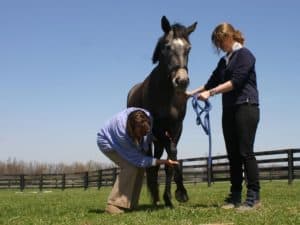Preventing EPM
- Topics: Article
"Why should we be concerned about EPM (equine protozoal myeloencephalitis)?" asked William J.A. Saville, DVM, Dipl. ACVIM, PhD, of The Ohio State University (OSU). "Because it is still an important equine disease, although we have a low incidence of the disease, and regardless of therapies available to treat EPM, it still results in neurological deficits."
Saville presented a summary of what is known about EPM, and he believes that with better understanding of the disease, wildlife management, risk-factor manipulation, prophylactic medications, and possible vaccination, that prevention of EPM can be attained.
EPM has received a lot of press, partially because of its devastating neurological effects on the horse. In recent years, researchers were able to complete the life cycle of the single-celled protozoan parasite that causes the disease, Sarcocystis neurona.
The Sarcocystis sp. life cycle consists of a scavenger (definitive host), carrion (intermediate host), and occasionally an aberrant host (such as the horse). The definitive host in the S. neurona life cycle is the opossum, which will eat just about anything. The horse apparently gets EPM from ingestion of opossum feces containing S. neurona sporocysts
Create a free account with TheHorse.com to view this content.
TheHorse.com is home to thousands of free articles about horse health care. In order to access some of our exclusive free content, you must be signed into TheHorse.com.
Start your free account today!
Already have an account?
and continue reading.

Written by:
Stephanie L. Church, Editorial Director
Related Articles
Stay on top of the most recent Horse Health news with












